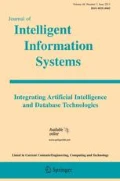Abstract
We present an integrated system for knowledge representation, calledAL -log, based on description logics and the deductive database language Datalog. AL-log embodies two subsystems, called structural and relational. The former allows for the definition of structural knowledge about classes of interest (concepts) and membership relation between objects and classes. The latter allows for the definition of relational knowledge about objects described in the structural component. The interaction between the two components is obtained by allowing constraints within Datalog clauses, thus requiring the variables in the clauses to range over the set of instances of a specified concept. We propose a method for query answering in AL-log based on constrained resolution, where the usual deduction procedure defined for Datalog is integrated with a method for reasoning on the structural knowledge.
Similar content being viewed by others
References
Abiteboul, Serge. (1990). Towards a deductive object-oriented database language. Data and Knowledge Engineering, 5, 263–287.
Abiteboul, Serge and Kanellakis, Paris. (1989). Object identity as a query language primitive. In Proc. of the ACM SIGMOD Int. Conf. on Management of Data, (pp. 159–173).
Aït-Kaci, H. and Nasr, R. (1989). LOGIN: A logic programming language with built-in inheritance. Journal of Logic Programming, 3, 185–215.
Baader, Franz, Bürckert, Hans-Jürgen, Hollunder, Bernhard, Nutt, Werner, and Siekmann, JörgH. (1990). Concept logics. In JohnW. Lloyd (Ed.), Computational Logics, Symposium Proceedings, pp. 177–201. Springer-Verlag.
Baader, Franz and Hollunder, Bernhard. (1991). Aterminological knowledge representation system with complete inference algorithm. In Proc. of the Workshop on Processing Declarative Knowledge (PDK-91), number 567 in Lecture Notes in Artificial Intelligence, (pp. 67–86), Springer-Verlag.
Borgida, Alexander, Brachman, Ronald J., McGuinness, Deborah L. and Alperin Resnick, Lori. (1989). CLASSIC: A structural data model for objects. In Proc. of the ACM SIGMOD Int. Conf. on Management of Data, (pp. 59–67).
Brachman, Ronald J., Pigman Gilbert, Victoria and Levesque, Hector J. (1985). An essential hybrid reasoning system: Knowledge and symbol level accounts in KRYPTON. In Proc. of the 9th Int. Joint Conf. on Artificial Intelligence (IJCAI-85), (pp. 532–539), Los Angeles.
Buchheit, Martin, Donini, Francesco M. and Schaerf, Andrea. (1993). Decidable reasoning in terminological knowledge representation systems. Journal of Artificial Intelligence Research, 1, 109–138.
Bürckert, Hans-Jürgen. (1994). A resolution principle for constrainted logics. Artificial Intelligence, 66(2), 235–271.
Cadoli, Marco, Palopoli, Luigi, and Lenzerini, Maurizio. (1996). Datalog and description logics: Expressive power. Preliminary report. In Proc. of the 1996 Description Logic Workshop (DL-96).
Ceri, S., Gottlob, G. and Tanca, L. (1990). Logic programming and databases. Springer-Verlag, Berlin.
Cohn, A.G. (1989). Taxonomic reasoning with many-sorted logics. Artificial Intelligence Review, 3, 89–128.
De Giacomo, Giuseppe and Lenzerini, Maurizio. (1994). Boosting the correspondence between description logics and propositional dynamic logics. In Proc. of the 12th Nat. Conf. on Artificial Intelligence (AAAI-94), (pp. 205–212). AAAI Press/The MIT Press.
Donini, Francesco M., Lenzerini, Maurizio, Nardi, Daniele and Nutt, Werner. (1991a). The complexity of concept languages. In James Allen, Richard Fikes, and Erik Sandewall, editors, Proc. of the 2nd Int. Conf. on the Principles of Knowledge Representation and Reasoning(KR-91), (pp 151–162). Morgan Kaufmann, Los Altos.
Donini, Francesco M., Lenzerini, Maurizio, Nardi, Daniele and Schaerf, Andrea. (1991b). A hybrid system integrating Datalog and concept languages. In Proc. of the 2nd Conf. of the Italian Association for Artificial Intelligence (AI*IA-91), number 549 in Lecture Notes in Artificial Intelligence. Springer-Verlag. An extended version appeared also in the Working Notes of the AAAI Fall Symposium “Principles of Hybrid Reasoning”.
Fitting, Melvin. (1990). First-Order Logic and Automated Theorem Proving. Springer-Verlag.
Frisch, Alan M. (1989). A general framework for sorted deduction: Fundamental results on hybrid reasoning. In Ron J. Brachman, Hector J. Levesque, and Ray Reiter, editors, Proc. of the 1st Int. Conf. on the Principles of Knowledge Representation and Reasoning (KR-89). Morgan Kaufmann, Los Altos.
Frisch, Alan M. and Cohn, A. G. (1991). Thoughts and afterthoughts on the 1988 workshop on principles of hybrid reasonig. AI Magazine, 12, 77–83.
Kifer, Michael, Lausen, Georg and Wu, James. (1995). Logical foundations of Object-Oriented and frame-based languages. Journal of the ACM, 42(3).
Levy, Alon Y., Rajaraman, Anand and Ordille, Joann J. (1996). Query answering algorithms for information agents. In Proc. of the 13th Nat. Conf. on Artificial Intelligence (AAAI-96), (pp. 40–47).
Levy, Alon Y. and Rousset, Marie-Christine. (1996). The limits on combining recursive Horn rules with description logics. In Proc. of the 13th Nat. Conf. on Artificial Intelligence (AAAI-96), (pp. 577–584).
Ling, Tok Wang, Mendelzon, Alberto O. and Vicille, Laurent (Eds.). (1995). Deductive and Object-Oriented Databases, number 1013 in Lecture Notes in Computer Science. Springer-Verlag.
Nebel, Bernhard. (1990). Terminological reasoning is inherently intractable. Artificial Intelligence, 43, 235–249.
Nebel, Bernhard and von Luck, Kai. (1988). Hybrid reasoning in BACK. In Proc. of the 3rd Int. Sym. on Methodologies for Intelligent Systems (ISMIS-88), (pp. 260–269). North-Holland Publ. Co., Amsterdam.
Schmidt-Schauß, Manfred and Smolka, Gert. (1991). Attributive concept descriptions with complements. Artificial Intelligence, 48(1), 1–26.
Stickel, Mark E. (1985). Automated deduction by theory resolution. Journal of Automated Reasoning, 1(4), 333–355.
Ullman, Jeffrey D. (1988). Principles of Database and Knowledge Base Systems, volume 1. Computer Science Press, Potomac, Maryland.
Van Hentenryck, Pascal. Constraint Satisfaction in Logic Programming. MIT Press, 1989.
Author information
Authors and Affiliations
Rights and permissions
About this article
Cite this article
Donini, F.M., Lenzerini, M., Nardi, D. et al. AL-log: Integrating Datalog and Description Logics. Journal of Intelligent Information Systems 10, 227–252 (1998). https://doi.org/10.1023/A:1008687430626
Issue Date:
DOI: https://doi.org/10.1023/A:1008687430626




